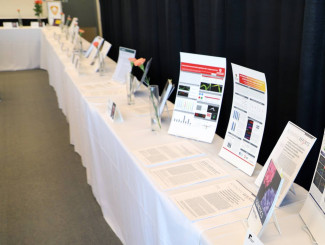Annual Ambrose Research Conference Awards Three Winners
- Image

Ambrose University is pleased to announce the winners of the Ambrose Research Conference (ARC), students Carly Russell, Austin McKinley, and Assistant Professor of History, Dr. Ryan Wilkinson.
Each year Ambrose hosts the Ambrose Research Conference - a gathering that aims to spotlight student, faculty, staff and alumni research and scholarly activity through a series of conference presentations and poster exhibits.
ARC 2021 was centred on the theme “Faithful Science: How the Sciences Impact Faith and Learning”. Participants were posed with a series of thematic questions such as, how do understandings of science, both historical and modern, impact historical, philosophical, sociological, psychological, literary and artistic endeavours? What are the areas of integration between our knowledge of the world around us and our Christian faith? How do topics in your discipline engage questions associated with faith or science, or both?
Participants aimed to highlight places of convergence and difference within and across their disciplines exploring this topic of science and faith, ultimately leading to an exceptionally diverse collection of presentations. ARC is pleased to award each winner with the Best Presentation Prize, a prize supported by the Science for Seminaries grant.
Below are the abstracts from each winner - an incredible picture of the dedication to each research project put forth by all participants.
Aboriginal Legends of Aurora Borealis
Carly Russell
An undergraduate student of introductory university astronomy gives an overview and reflective commentary on her term research project titled “Aboriginal Legends of Aurora Borealis” which included a growing awareness of the integration of faith with the science. This is a self-reflective study into one’s own thinking. Initially starting as a science investigation about myths and misconceptions, during the selection, research, and planning of her project the role of faith in relation to science and to the academic process changed. Observations about the receptiveness of the course professor and peers to this product will be reviewed. Concluding comments will review the reasons why, in this case, the study of science and faith may seem dissimilar but that possible connections are apparent and likely of value to future courses and for future learners.
Creator God and the blossoming world: Genesis, ancient near eastern creation myths and evolved biodiversity
Austin McKinley
Whether the Enuma Elish, Atrahasis Epic, or Genesis 1-3, Ancient Near Eastern (ANE) creation accounts attempted to answer questions of cosmology and as a result defined the fundamental nature of creation for the ancients. Comparative analysis of these accounts to one another can provide powerful hermeneutical insight into the claims of the genesis mythopoeia. Yet, one concern we may rightfully raise is what manner of relationship or bearing the theory of evolution can have on this ancient biblical cosmology even when it is read in the light of its own contextual zeitgeist. Is there a level of harmonization possible between the theory of evolution and the contextualized Genesis account? If so, what approaches are available to the reader which help to produce such a harmonized reading? This paper will focus on the idea of created order out of pre-existing chaos in Genesis 1:1-2:4 as understood in terms of other ANE creation accounts and its potential correlation to the evolutionary process as an – albeit imperfect – engine of biodiversity and orderly ecosystems.
The Last Horizons of Roman Gaul
Dr. Ryan Wilkinson, Assistant Professor of History
How did the ‘Fall of the Roman Empire’ change social and economic networks in what is now France? How did emerging barbarian kingdoms shape those changes? Can the transition from Roman Gaul to medieval France illuminate broader processes of collapse and continuity? This talk summarizes findings published late last year, with support from the Ambrose Research Fund, in my book, The Last Horizons of Roman Gaul: Communication, Coin Circulation, and the Limits of the Second Burgundian Kingdom. The Second Burgundian Kingdom among the most ‘pro-Roman’ of late antiquity’s ‘successor states’ – occupied one of Europe’s strategic transit corridors. Yet historical and archaeological investigation of the kingdom’s social networks reveals significant relative isolation that even reshaped the mental geographies imagined by local Gallo-Romans. These findings deepen our understanding of the end of antiquity, and highlight the complex relationship between cultural continuity and social fragmentation in a period of collapse.
Congratulations to all on their valuable explorations of science and faith!
